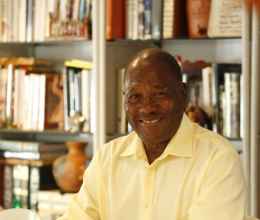
“The conundrum of color is the inheritance of every American, be he/she legally or actually Black or White. It is a fearful inheritance, for which untold multitudes, long ago, sold their birthright…
It is not pleasant to be forced to recognize, more than thirty years later, that neither this dynamic nor this necessity have changed. There have been superficial changes, with results at best ambiguous and, at worst, disastrous. Morally, there has been no change at all and a moral change is the only real one…
The only real change vividly discernible in this present, unspeakably dangerous chaos is a panic-stricken apprehension on the part of those who have maligned and subjugated others for so long that the tables have been turned.”
–James Baldwin, Preface to the 1984 edition of “Notes of a Native Son”
Thirty years after publishing his “Notes of a Native Son,” James Baldwin revisited his influential essays. It is interesting to see the 60 year old reflect on the words of a younger version of himself entering the height of the Civil Rights Movement.
Growing up in Broward County schools, we learned about the Civil Rights Movement like we do American Revolution: Years of mistreatment create a conflict. The freedom fighters are heroes, the oppressors, villains. Bloody battles are fought, the war is eventually won, and a new, fairer system overhauls the old.
That was a lie.
Baldwin observed near the end of his life that the conclusion of the Civil Rights Movement and the important victories its heroes secured did not mark the end of racism in America. Americans were subject and doomed to repeat a vicious cycle of racial subjugation for generations thereafter. White supremacy continued to rear its ugly head in new forms in American life.
Around the time of Baldwin’s secondary observation, just thirty years after the brutal fight for civil rights, policymakers in Washington used aggressive city planning to decimate Black communities and destroy generations of wealth in the process. And while communities were still reeling from this devastation, Congressional power brokers gave the criminal justice system and police more power to disproportionately incarcerate Black and Hispanic Americans compared to white Americans for drug crimes, even with similar drug use rates. Families and loved ones to this day live with the repercussions of our country's failed drug war.
A predecessor of Baldwin, Frederick Douglass, also challenged white supremacy for most of his life. And while many white Americans claim to hold him in high regard today, he too documented the shameful unwillingness of America's political establishment to pursue meaningful reconciliation with Black Americans, even after the Civil War ended and the 13th Amendment was ratified. Racism also did not end with Reconstruction, as Douglass woefully witnessed. He challenged America’s commitment to equality in one of his most famous speeches, delivered in 1890:
“The United States Government made the negro a citizen, will it protect him as a citizen? This is the problem. It made him a soldier, will it honor him as a patriot? This is the problem. It made him a voter, will it defend his right to vote? This is the problem. This, I say, is more a problem for the nation than for the negro, and this is the side of the question far more than the other which should be kept in view by the American people.”
Douglass’ questions are ones many of us are still asking, more than a century after they were spoken.
It is difficult to use the word “unprecedented” as 2023 begins replete with the hyper-focused scrubbing of Black history in Florida schools. Gerrymandering and voter suppression tactics in Florida, stalled debates about police accountability, the continued call to protect and honor Black lives, and, now, callbacks to Jim Crow-era sentencing guides add to these harmful tactics to silence Black Americans and obstruct the pursuit of true equity.
Black history is American history.
Black history is American history. Black Americans helped engineer the Space Race, earned gold medals in our country’s name at the Olympics for generations, birthed rock and roll music (Robert Johnson and Chuck Berry), and were present at the very moment that begat the country’s founding. The Black experience is uniquely American. Still, the history and contributions of the Black people who helped build this country is devalued in American history.
This Black History Month, we encourage all Floridians to learn of the foundational contributions Black Americans have made to our state and country.
All Floridians must challenge attempts to cull Black history to marginal interpretations, and efforts to chill our voices, and our freedom. We cannot be silent observers of the vicious cycles of subjugation that are as old as this country. Instead, we must remind each other that mere scraps of progress do not equate to the necessary moral shift needed to achieve true equality. We must challenge each other to reevaluate our own values and commitments to democracy, not just for ourselves, but for everyone.


